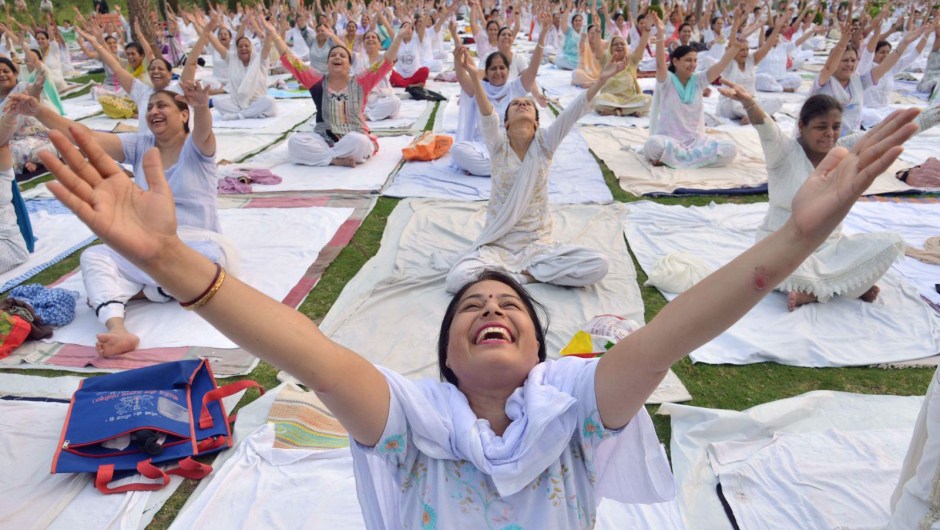1 of 15
|
From India to South Korea, this is how the world celebrated International Yoga Day.
(Credit: SANJAY KANOJIA / AFP / Getty Images)
2 of 15
|
With smiles, this group of people celebrate International Yoga Day in a park in Amritsar, India.
(Credit: NARINDER NANU / AFP / Getty Images)
3 of 15
|
Even the little ones joined the celebration in Seoul, South Korea.
(Credit: Chung Sung-Jun / Getty Images)
4 of 15
|
One of the most famous places where the celebration of International Yoga Day takes place is in Times Square in the Big Apple.
The city closes the important street for the festival.
(Credit: BRIGITTE DUSSEAU / AFP / Getty Images)
5 of 15
|
At the foot of the Sydney Opera House, dozens of people perform the Adho Mukha Svanasana, or the downward facing dog pose.
(Photo credit should read WENDELL TEODORO / AFP / Getty Images)
6 of 15
|
A group of women dressed in a yellow flannel and white pants, perform the asana Anjaneyasana or the posture of the crescent moon.
(Credit: VCG / VCG via Getty Images)
7 of 15
|
A South Korean woman shows, with a painting on her face, her love for yoga.
(Credit: Chung Sung-Jun / Getty Images)
8 of 15
|
Uttar Pradesh policemen practice yoga in Allahabad, India.
(Credit: SANJAY KANOJIA / AFP / Getty Images)
9 of 15
|
A group of men perform the Setu Bandha Sarvangasana pose or the bridge pose in a park in New Delhi, India.
(Credit: CHANDAN KHANNA / AFP / Getty Images)
10 of 15
|
Photos cannot be missing during International Yoga Day.
(Credit: ROBERTO SCHMIDT / AFP / Getty Images)
11 of 15
|
A woman in Nepal enjoys one of the most important poses in yoga, the Savasana or the dead man's pose.
(Credit: PRAKASH MATHEMA / AFP / Getty Images)
12 of 15
|
You can also celebrate International Yoga Day in a pool.
To sample a button.
(Credit: SUNIL VERMA / AFP / Getty Images)
13 of 15
|
About 500 people practice yoga at Jing'an Park in Shanghai, China.
(Credit: VCG / VCG via Getty Images)
14 of 15
|
A Hindu soldier takes part in the celebration of International Yoga Day.
In Sanskrit, yoga means unity.
(Credit: ARUN SANKAR / AFP / Getty Images)
15 of 15
|
A group of students send a message to the world: "Keep smiling."
(Credit: ARUN SANKAR / AFP / Getty Images)
(CNN) -
It is truly an autumn gale of epic proportions, as turbulent winds of uncertainty whip and fill us with great anxiety.
“It is the pandemic, it is social unrest, it is climate change and forest fires.
It's the choice, it's the next vacation, ”said Vaile Wright, senior director of Healthcare Innovation at the American Psychological Association (APA).
"I don't remember a time in my life, or in most people's adult lives, when they had so much hardship," Wright said. "
It's the cumulative effect of one thing on top of another, on top of another, to the point where I think people are just numb or feeling so overwhelmed that they freeze.
If your coping skills have worn down to the core in recent months, there are actions you can take to increase your well-being and strengthen your endurance during this stressful time.
These tips can help you avoid pandemic fatigue caused by coronavirus stress
1. Get some exercise
It may seem counterintuitive, but getting up and moving when you least want to is one of the best ways to counteract stress and improve your health and mental state.
advertising
Exercise regulates the body's central stress response system, called the hypothalamic-pituitary-adrenal axis, which can help reduce cortisol and other harmful stress hormones.
«In reaction to stress, our body throws itself to fight, flee or freeze as a survival mechanism.
But when the threat wears off, we are supposed to relax and release cortisol and other stress hormones that kick in, "said Wright.
"But when we're in this constant state of hyperarousal, hypervigilance, we don't get that release, and that stress over time really wears out our bodies, our minds," he added.
Walking outdoors, with physical detachment, is one of the best ways to exercise, according to the US Centers for Disease Control and Prevention (CDC).
But cold weather is coming and you may want other options as well.
Pick a physical activity that inspires you and is doable, suggests Lisa Drayer, CNN's Health and Nutrition contributor.
Especially during the pandemic, there are lots of free app trials and
od
classes
online, so you can use this time as an opportunity to try something new, Drayer suggests.
And you don't need a ton of expensive exercise equipment to achieve your goal.
Try dancing, gardening, or cleaning the house vigorously to get moving.
For weight training, anything that gives you muscle tension can work, like jugs of water, books, or even your kids, Drayer advises.
Try a set of yellow, green, and red resistance bands, which can be used to work your back, biceps, triceps, shoulders, and legs.
12 questions about yoga: a philosophy that is more than standing on your head
2. Get a physical and mental reward with yoga
Yoga and its health benefits 3:32
Yoga, of course, is a form of physical exercise, and is widely recommended to help alleviate depression and other mental health conditions.
Scientists believe that yoga increases blood circulation in the brain, especially in areas such as the amygdala and hippocampus, which have roles in controlling motivation, mood, and the response to stress.
But yoga is also a spiritual discipline, designed to blend mind and body.
A yoga lifestyle incorporates physical postures, breath regulation, and mindfulness through the practice of meditation.
There are many yoga options on the internet to choose from.
“Yoga philosophy teaches that the body, mind and spirit are all interconnected: what you do in one area, for example, a physical exercise to strengthen the leg muscles, will have an effect on all other areas of your system, ”Laurie Hyland Robertson, editor-in-chief of Yoga Therapy Today, a magazine published by the International Association of Yoga Therapists, said in a previous interview with CNN.
"So we can expect that leg exercise, especially when approached in a conscious and purposeful way, will affect not only your quads but also your emotional state, your body physiology and even your mental outlook," said Robertson.
3. Improve your sleep
There is another benefit of exercise: it will improve the quality of your sleep, one of the best things you can do to relieve stress and improve your mood.
What's more, better sleep protects your heart, improves your brain, and reduces your desire for a snack.
It's not just about sleeping longer.
You're trying to give your body time to go through enough sleep cycles to repair itself, which means going from light to deep sleep and vice versa.
Set yourself up for success by developing good sleep habits that will train your brain for restful sleep.
4. Seek to relax
Relaxing while stressed to the max sounds almost impossible, right?
Well it is not.
Try progressive muscle relaxation, a stretching technique
CNN
fitness
contributor Dana Santas
uses to recover from exercise.
You can flex and tense each muscle group in the body, holding the tension for up to 20 seconds.
Then quickly release the tension and imagine that you breathe through that part of the body.
Start with the toes, then the feet, then the calves, and so on with all the muscles in the body.
Sleep anxiety and daylight saving time can exacerbate insomnia, but stretching can help
5. Practice deep breathing
Something as simple as taking deep and slow breaths can do amazing things to our brains and therefore to our stress, experts say.
Deep breathing realigns the stressed part of our body, called the sympathetic system, with the parasympathetic, or "rest and restore" system.
While there are many types of breathing, much research has focused on "cardiac coherence," in which you inhale for six seconds and exhale for six seconds for a short period of time.
Focus on abdominal breathing, or breathing deep into your lungs, placing your hand on your belly to feel it move.
"Learning to breathe lets you know that you have the ability to calm yourself physiologically," said Stress Management expert Dr. Cynthia Ackrill, editor of Contentment magazine produced by the American Institute of Stress, in a previous CNN interview. .
"You start to realize that you are detached from what is happening to you and you can choose a response rather than a simple primary reaction," Ackrill said.
6. Meditate for change
At the Center for Healthy Minds at the University of Wisconsin-Madison, researchers studied the brains of Tibetan Buddhist monks recruited by the Dalai Lama and found surprising results: Tens of thousands of hours of compassionate meditation had permanently altered the structure and function of the monks brain.
A 41-year-old monk had the brain of a 33-year-old.
But you don't have to dedicate your life to meditation to see change, explained Richard Davidson, founder and director of the Center for Healthy Minds, in a previous CNN interview.
Davidson pointed to the results of a randomized controlled trial of people who had never meditated before.
Using direct measures of brain structure and function, he found that it only took 30 minutes of meditation practice a day for two weeks to produce a measurable change in the brain.
"When people are taught these kinds of mental exercises, it actually changes the function and structure of their brain in ways that we think support these kinds of positive qualities," said Davidson, who is a professor of psychology and psychiatry.
7. Appreciate your surroundings
One of Davidson's favorite mindfulness exercises is cultivating appreciation.
"Just to remind the people in our lives that we have received some kind of help," Davidson said.
"Remember them and appreciate the care and support or whatever these individuals have given you."
"You can take a minute every morning and every night to do this," he said.
"And that kind of appreciation is something that can foster a sense of optimism about the future."
Like exercise, mindfulness will need to be practiced regularly to keep the positive outlook of the brain in good shape, Davidson said.
But the effort is definitely worth it.
"It's really about nurturing the mind," he said.
"And there is ample evidence to suggest that there are real benefits related to physical and psychological health."
8. Strive to be optimistic
Science has shown that people who practice gratitude are happier and more optimistic, and you can easily learn how to do it.
“One thing I recommend to everyone in times of fear is that they write two or three things each day that they are grateful for.
Change your view of the world, ”said trauma counselor Jane Webber, professor of Counselor Education at Kean University in New Jersey, in a previous CNN interview.
And as you do so, list the positive experiences you had that day, which can also boost your optimism.
Previous research has found a direct link between optimism and a healthier diet and exercise behaviors, as well as better heart health, a stronger immune system, better lung function, and a lower risk of mortality, among others.
One of the most effective ways to increase optimism, according to a meta-analysis of existing studies, is called the "Best Possible Me" method, in which you imagine or journal about yourself in a future in which you have achieved all your goals. of your life and all your problems solved.
To do this, write for 15 minutes about a future day in your life in which you have achieved everything you want.
Then spend five minutes imagining that reality.
In a 2011 study, students practiced the 'Best Possible Me' exercise for 15 minutes a week for eight weeks.
Not only did they feel more positive, the feelings lasted for about six months.
9. Sketch a smile
It has long been said that "laughter is the best medicine," and that applies to the anxiety of our time, experts say.
Remember, you can't be anxious and smile at the same time.
That's a physiological thing, "Webber said.
So watch funny movies, listen to comedy routines, ask everyone you talk to on the phone to tell you a joke.
Give them back by doing the same.
10. Make a social phone tree
Staying socially connected with friends and loved ones even when physically separated is a key way to survive this stressful time.
Of course, technology is a great way for many of us to do it, but some family members, such as grandparents, may not be as adept at using Facebook, FaceTime, and Zoom, for example.
Trauma psychologist Shauna Springer, who has spent a decade working with military veterans suffering from post-traumatic stress disorder, or PTSD, suggests creating a phone tree.
"Instead of just relying on social media, we can make a list of the 10 or 20 people that matter most to us and put them on our phone on a rotating basis," said Springer.
"We are going to call one of those people every day."
Next, Springer suggests adding more people from our outer circle of friends and associates that we may not be as close to and putting those people on that daily call rotation.
That is especially critical if you think those people may be especially isolated right now.
"Reaching out and connecting with people, especially those who are isolated, and giving them a space to talk about their experience and anxiety during this unprecedented time of anxiety and then sharing our own experience is how we will get through this," he said.
"When we connect, we survive."
11. Prioritize personal care and routines
It's important to make time for yourself right now, even in the midst of overwhelming anxiety, experts say.
That can include hobbies like knitting, taking an extra long shower or bath, reading, having tea, or calling family members.
Better yet, schedule these natural stress relievers into your day as well as meals and other obligations, suggests CNN contributor Drayer.
Stretching your body after waking up or saluting the sun can help your blood flow and your body move in the morning, she says.
Establishing a wellness routine is also an important part of self-care.
Routines allow you to focus on health goals by creating structure and organization, which can be particularly beneficial when things seem out of your control.
Being predictable can "induce calm and control the stress caused by unpredictability and uncontrollability, increasing our belief that we are in control of a situation that would otherwise be out of our hands," researchers from Tel Aviv University have found. .
12. Focus on what you can change
Fight anxiety, experts suggest, by taking control of your thinking.
"One of the ways to do it is to take out a sheet of paper, put a line in the middle and write the things that we can't control right now on one side, and write what we can control on the other," Springer said.
"And then we form an action plan that allows us to move forward on those things that we can control."
This prevents us "from getting into that feeling of helplessness or whether you will just be sitting in our trench waiting for more bad news to come," he said.
"In fact, we are making progress in the things we want to do with our lives, even if there are some very challenging circumstances right now."
This is useful for some people who may not feel capable, especially if they lost a job or were laid off when the economy came to an abrupt halt.
"Losing a job is a seismic stressor, one of the most stressful things that can happen to you," said Springer.
"But you can sit back and reflect on your negative situation or you can use the time to learn something new, go deeper or acquire some skills."
She points out the many high-quality, inexpensive, or free training programs on the internet that can add skills to your profession or even help you transition to something new.
"So that people can use this time to develop skills and become smarter, stronger and more prepared for when the workforce really does come back in full force," said Springer.
Anxieties Stress Mental Health















